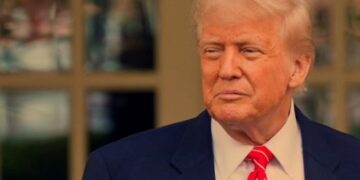A federal appeals court has delivered an important legal challenge to President Donald Trump’s core economic agenda, ruling that his sweeping global tariffs are an illegal overreach of presidential authority. The decision, which upholds a lower court’s finding, found that Trump exceeded his powers under the International Emergency Economic Powers Act (IEEPA).
This ruling is a major legal and political setback, and its implications extend far beyond the US, casting a shadow over global markets and trade relations. The court has given the administration until mid-October to appeal the decision to the US Supreme Court.

Dissecting the Legal Basis of the Tariffs
The court’s 7-4 decision hinged on a key legal question: does the IEEPA grant the president the power to impose tariffs? The judges concluded that it does not. They argued that the act, which allows the president to take action in response to a national emergency, does not explicitly mention tariffs or the power to tax, a power that is reserved for Congress.
The ruling challenges Trump’s argument that a national emergency, such as a large trade deficit, gives him the unilateral authority to impose broad import taxes. The court’s finding reinforces the constitutional principle of the separation of powers and the concept that the “power of the purse” belongs to the legislative branch.
The Economic and Political Fallout of the Ruling
The court’s decision creates a new layer of uncertainty for the US economy. Experts warn that as countries and businesses await a potential Supreme Court review, they could delay trade and investment with the US, which could dampen economic activity.
Furthermore, if the Supreme Court upholds the ruling, it could force the US Treasury to refund billions of dollars in tariffs already collected. The ruling also threatens to undermine a key component of Trump’s negotiating strategy—the threat of tariffs—and could embolden foreign governments to resist future US demands or even renegotiate existing trade deals.
On the other hand, a Supreme Court reversal could set a significant example, giving the president unprecedented authority over trade policy. The political stakes are high, with Trump vowing to fight the decision, believing the conservative-majority Supreme Court will rule in his favor.

















